
The Office of Indigenous Ministries celebrates the longstanding presence and influence of Native Americans throughout the history of The Episcopal Church in the U.S., from its earliest days in the New World.
Exercising a deep spirituality grounded in respect for and care of creation and others, Indigenous Episcopalians enrich the church through myriad roles in lay and ordained ministry, modeling wisdom, resilience, and forbearance.
Indigenous Ministries works for the full inclusion of Indigenous people in the life and leadership of the church. In seeking to fulfill this goal, the church welcomes partners who will:
- Guarantee that Indigenous people are fully recognized and welcomed into congregational life through education, advocacy, and leadership development;
- Create influential leadership roles in the church for Indigenous people;
- Develop a national support system for continued remembrance, recognition and reconciliation of all Indigenous people within the church and world;
- Develop a network of leadership and educational resources to empower Indigenous people to prepare for mission and ministry in The Episcopal Church and the world;
- Provide resources, advocacy and support to Indigenous theology students, those in the ordination process, and lay congregational leaders.
As an institution, The Episcopal Church recognizes and repents of its harmful treatment of Native Americans. In 1997, the church signed a new covenant of faith and reconciliation almost 400 years after Jamestown colonization, apologizing for its past actions and launching a decade of “remembrance, recognition and reconciliation.” In 2009, the church’s General Convention passed a resolution repudiating the 15th century-based Doctrine of Discovery, which “held that Christian sovereigns and their representative explorers could assert dominion and title over non-Christian lands with the full blessing and sanction of the Church.”
In 2021, Presiding Bishop Michael B. Curry and House of Deputies President Gay Jennings issued a statement in response to the discoveries of mass graves of Indigenous children on the grounds of former boarding schools in Canada, condemning such practices and committing to “the work of truth and reconciliation with Indigenous communities in our church.” The upcoming 80th General Convention in July 2022 will include further discussion and action about the legacy of Indigenous schools associated with The Episcopal Church during the 19th and 20thcenturies.
The vital work of remembrance, recognition and reconciliation in connection with our Indigenous siblings continues.
